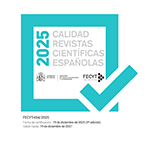Moral digital literacy for the detection of deepfakes and audiovisual fakes
Abstract
Deepfakes are manipulated videos where a person's face is supplanted by that of another through Artificial Intelligence. These photorealistic contents can become weapons of harassment, propaganda or social conflict. This theoretical innovation research delves into the emerging scientific literature on deepfake in Social Sciences, laying its foundations on the research of Wenceslao Castañares. Its objectives are to analyse the phenomenon, find tools to detect and combat it, and inaugurate a new way of moral digital literacy of special interest in the field of communication, due to its social and political importance. A two-step diachronic methodology is used. First, a longitudinal bibliographic investigation is carried out and a historical, systemic and descriptive description is offered, with the most important features of the phenomenon, nature, operation and possible uses. Second, there is a conscious scientific observation of more than fifty deepfake videos, to perceive the phenomenon, achieve greater generalization and guarantee the validity of the results. The results show that although detection software for this type of fakes has been created, it is not yet freely available. The only way to recognize the deepfake is through a digital moral education, which can detect a series of hyper-realistic visual parameters: the frequency of blinking, the subtle intermittent effect of the faces or the transitions between the head and neck.
Downloads
Article download
License
In order to support the global exchange of knowledge, the journal CIC. Cuadernos de Información y Comunicación is allowing unrestricted access to its content as from its publication in this electronic edition, and as such it is an open-access journal. The originals published in this journal are the property of the Complutense University of Madrid and any reproduction thereof in full or in part must cite the source. All content is distributed under a Creative Commons Attribution 4.0 use and distribution licence (CC BY 4.0). This circumstance must be expressly stated in these terms where necessary. You can view the summary and the complete legal text of the licence.










